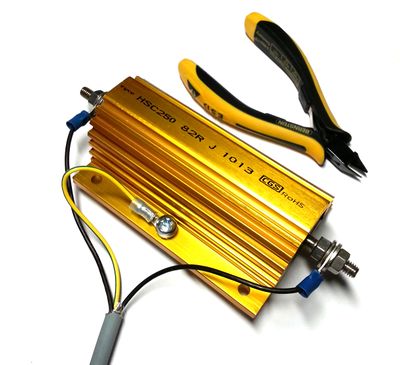Difference between revisions of "Regenerative resistor"
From Granite Devices Knowledge Wiki
| [checked revision] | [checked revision] |
(Created page with "250 Watt 82 ohm regenerative resistor suitable for Argon driveRegenerative resistors are usually a part with servo systems to absorb returned...") |
|||
| Line 5: | Line 5: | ||
{{tip|In most installations braking resistor is not needed at all. Resistor is needed in cases where fast moving motor with high inertial load is stopped rapidly causing conversion of the kinetic energy into electric current which needs to be dissipated by a resistor. Experimenting without resistor is safe as drive's overvoltage protection will prevent any damage occurring. If drive faults to overvoltage fault during deceleration, then try adjusting [[FOV]] to higher value or add a braking resistor.}} | {{tip|In most installations braking resistor is not needed at all. Resistor is needed in cases where fast moving motor with high inertial load is stopped rapidly causing conversion of the kinetic energy into electric current which needs to be dissipated by a resistor. Experimenting without resistor is safe as drive's overvoltage protection will prevent any damage occurring. If drive faults to overvoltage fault during deceleration, then try adjusting [[FOV]] to higher value or add a braking resistor.}} | ||
| − | [[ | + | See also: |
| + | *[[Overvoltage and undervoltage faults]] | ||
| + | |||
| + | [[Category:Glossary]] | ||
Revision as of 23:15, 23 July 2015
Regenerative resistors are usually a part with servo systems to absorb returned energy from decelerating or braking servo axis.Servo drive with motor can act two ways: energy supply and energy generator. The generator behavior occurs during decelerations and this causes current flow from motor to drive power supply capacitors. If that generated energy is not absorbed anywhere, the voltage of capacitors will rise above overvoltage threshold and trigger an software clearable overvoltage fault.
| In most installations braking resistor is not needed at all. Resistor is needed in cases where fast moving motor with high inertial load is stopped rapidly causing conversion of the kinetic energy into electric current which needs to be dissipated by a resistor. Experimenting without resistor is safe as drive's overvoltage protection will prevent any damage occurring. If drive faults to overvoltage fault during deceleration, then try adjusting FOV to higher value or add a braking resistor. |
See also:
